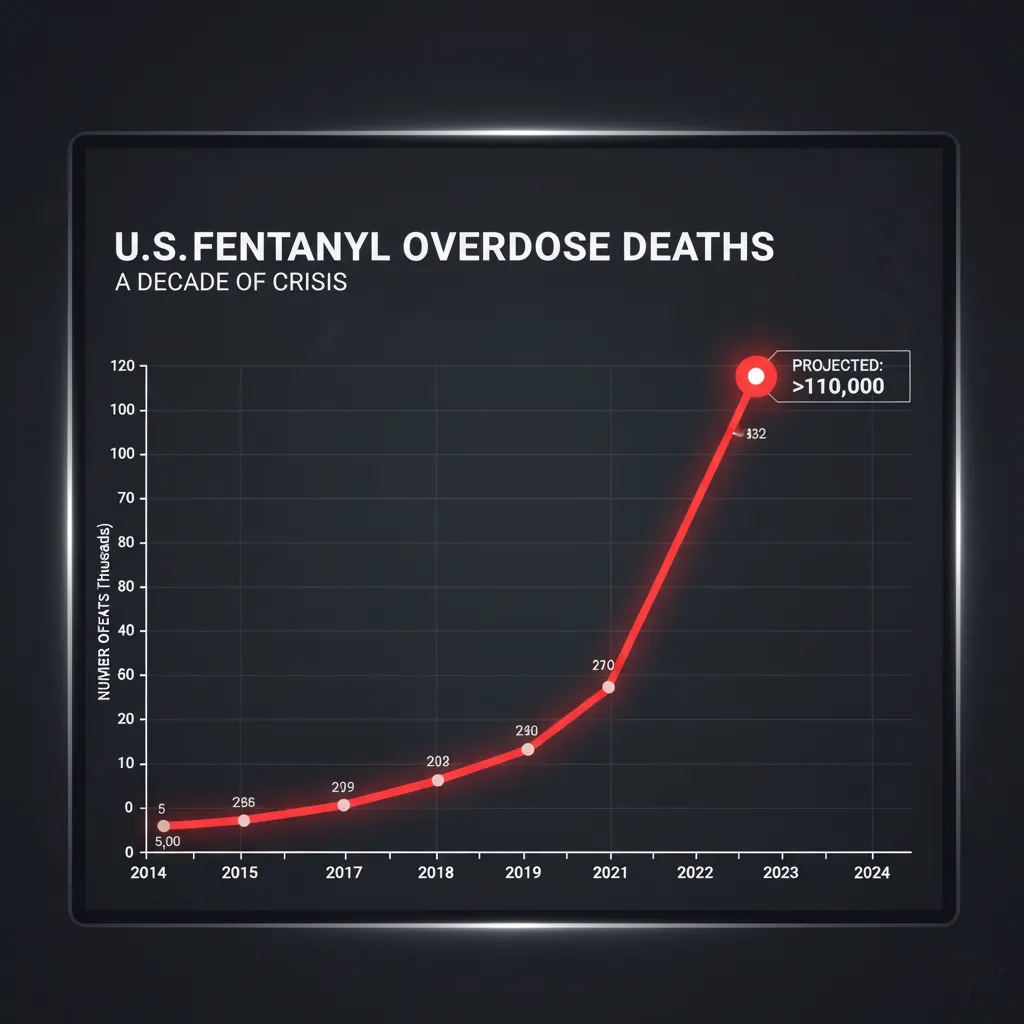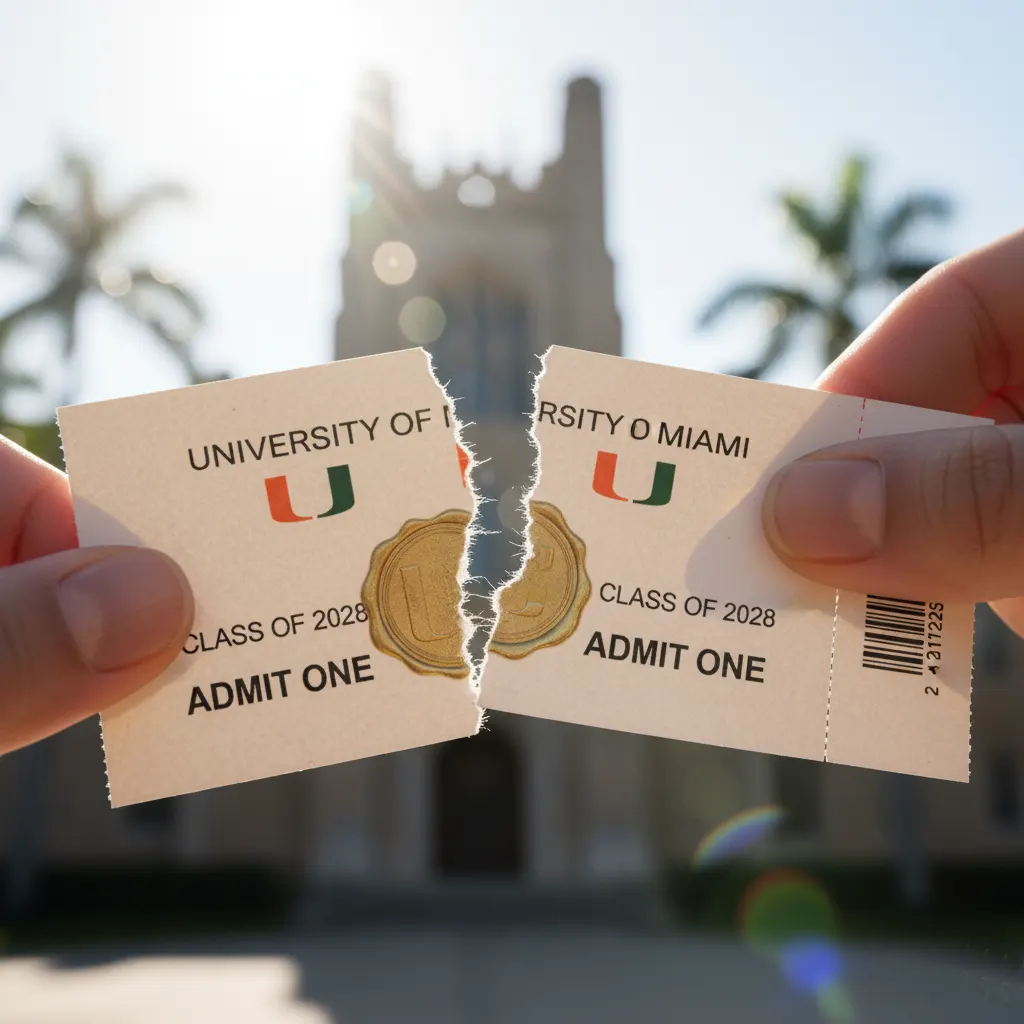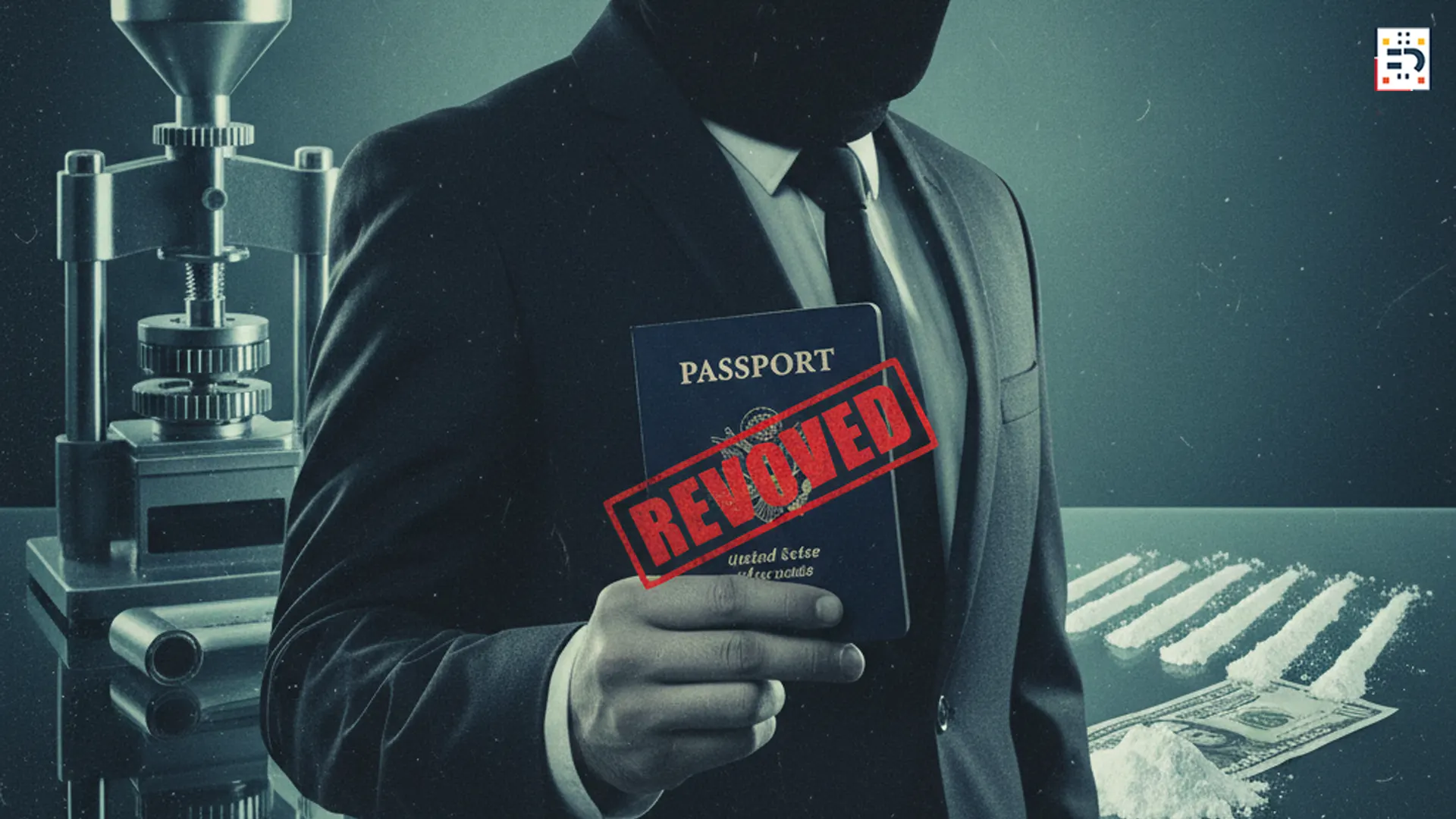The Silent Weapon in America’s Fentanyl Crisis
Imagine waking up to discover your U.S. visa has been revoked overnight—not because you’ve been arrested or charged with a crime, but because someone in Washington decided your family connections or business dealings make you a liability in the war on drugs. No trial, no courtroom drama, just a bureaucratic letter ending your travel privileges to the United States.
This isn’t dystopian fiction. It’s the reality of America’s newest and most aggressive drug enforcement tactic, and it’s happening right now across multiple continents.
Just this morning, news broke that the United States has revoked visas for at least 50 Mexican politicians and government officials. It’s the latest development in what experts are calling the “Unvisa War”—a diplomatic offensive that’s quietly reshaping how America fights the opioid epidemic that continues to devastate communities across the nation.

The Fentanyl Crisis: By the Numbers
The statistics paint a devastating picture of the drug overdose epidemic in America:
The fentanyl crisis remains unprecedented, with overdoses being the leading cause of death for Americans ages 18 to 44, and more than 40 percent of Americans knowing someone who has died from an opioid overdose. According to the U.S. State Department, in 2024 the United States averaged over 220 overdose deaths daily.
The economic toll is equally staggering. In 2023 alone, illicit opioids, primarily fentanyl, cost Americans an estimated $2.7 trillion (in December 2024 dollars), equivalent to 9.7 percent of GDP, according to White House data.
Fentanyl continues to be the primary cause of drug overdose deaths in the United States, and even a very small amount of fentanyl—2 milligrams, the size of a few grains of sand—can cause a lethal overdose, according to the U.S. Government Accountability Office.
Faced with this catastrophic death toll, the Trump administration made a calculated decision: if traditional drug enforcement can’t stop the flow at the border, the U.S. would go after the people who enable trafficking—and hit them where it hurts most.
The New Visa Restriction Policy: A Paradigm Shift in Drug Enforcement
On June 26, 2025, Secretary of State Marco Rubio unveiled a sweeping expansion of visa restriction policies that fundamentally changed the rules of engagement in the drug war. The official State Department announcement marked a turning point: visa revocations would now extend beyond drug traffickers themselves to include their family members, close associates, and anyone deemed complicit in the narcotic supply chain.
The visa restriction policy targets family members and close personal and business associates of those sanctioned on accusations of being involved in drug trafficking, according to UPI reporting.
The message was unmistakable: if you’re connected to the fentanyl trade, America is now off-limits—and so is everyone around you. This represents a dramatic expansion of U.S. immigration law enforcement in the context of counternarcotics operations.

The Global Dragnet: Visa Revocations Across Continents
What started as a policy announcement quickly became a coordinated global operation spanning multiple countries and targeting various levels of the drug trafficking ecosystem:
Mexico: The Primary Battleground
Mexico has become the most dramatic theater of this new enforcement strategy. The visa withdrawals send a powerful signal of the United States’ new willingness to challenge Mexican officials, with the law allowing the State Department to cancel the visas of relatives of a sanctioned official who may have benefited from their illicit gains, reports ProPublica.
At least 50 Mexican politicians and government officials have had their visas revoked, including members of President Claudia Sheinbaum’s ruling Morena party. Even Marina del Pilar Ávila, the governor of Baja California, found herself stripped of U.S. travel privileges alongside her husband. The Trump administration’s list reportedly includes state governors, party leaders, and former Cabinet ministers—a stunning diplomatic gambit suggesting the U.S. believes cartel influence reaches the highest levels of Mexican government.
India: Targeting Fentanyl Precursor Suppliers
In September 2025, the U.S. Embassy in New Delhi announced visa revocations for business executives and corporate leadership involved in trafficking fentanyl precursors—the chemical ingredients essential to manufacturing the deadly synthetic opioid.
These actions are taken pursuant to section 221(i), section 212(a)(2)(C), and 214(b) of the Immigration and Nationality Act, making these individuals and close family members ineligible for travel to the United States.
This move signaled that the visa revocation strategy wasn’t just about street-level dealers or cartel members—it was targeting the white-collar suppliers who make international drug manufacturing possible.

Cultural Targets: Musicians Who Glorify Cartels
In perhaps the most unusual application of this policy, the State Department even revoked visas for Mexican band Los Alegres del Barranco for performing narcocorridos—songs that glorify drug cartel kingpins. If you sing praise to notorious traffickers like El Mencho or El Chapo, you’re now persona non grata in America.
Administrative Justice: Enforcement Without Courtrooms
Here’s where the visa revocation strategy becomes both tactically brilliant and constitutionally controversial.
Traditional drug enforcement requires evidence, trials, due process, and adherence to criminal procedure. Visa revocations require none of that. The law does not require a conviction to bar a visa applicant on drug trafficking grounds; if the consular officer knows or has “reason to believe” that the applicant is or has been a drug trafficker or assisting one, then that applicant is permanently ineligible, according to immigration law experts at Visarefusal.com.
The State Department doesn’t need to prove anything in federal court. They don’t need to file criminal charges. They simply invoke immigration law’s broad discretionary powers under the Immigration and Nationality Act (INA), specifically sections 212(a)(2)(C) and 212(a)(3)(C), and suddenly someone’s ability to enter the United States evaporates.
For Mexican politicians who maintain second homes in Texas or California, who send their children to American universities, who conduct cross-border business—this is professionally and personally devastating. For Indian pharmaceutical executives who travel regularly to the U.S. for conferences and business deals—it’s potentially career-ending.
The strategic genius of the policy, from an enforcement standpoint, is its operational efficiency:
- No lengthy extradition battles
- No jurisdictional disputes with foreign governments
- No years-long trials
- Just administrative action with immediate, often irreversible consequences

Collateral Damage: When Families Become Targets
Perhaps the most ethically complex aspect of the expanded visa restriction policy is its reach to family members and associates. Executive Order 14059 was first issued under President Trump, and the current expansion has been announced by Secretary of State Marco Rubio, reflecting a bipartisan approach to the opioid crisis, notes VisaVerge.
Under the June 2025 restrictions, being related to a suspected drug trafficker is now sufficient grounds to lose your U.S. visa. This represents a philosophical shift in accountability—we’re no longer just punishing alleged wrongdoers, we’re punishing their entire social and familial ecosystems.
The policy logic is that drug lords use their families to launder money, store assets, and enjoy the fruits of illicit trade. By making families face tangible consequences, the strategy aims to increase the personal cost of involvement in narcotics trafficking.
But critical questions remain: Is the adult daughter of a cartel member responsible for her father’s alleged crimes? What about the business partner who genuinely had no knowledge? The policy operates in legal gray areas that would never survive traditional judicial scrutiny—which is precisely why it doesn’t go through the criminal justice system.
Does the Visa Revocation Strategy Actually Reduce Drug Deaths?
The effectiveness question is paramount, yet the State Department has released limited data on measurable outcomes. While U.S. Customs and Border Protection reports significant drug seizures at the border, directly linking visa revocations to reduced trafficking remains challenging to quantify.
Interestingly, the result nationally is roughly 25,000 fewer deaths from fentanyl and other street drugs in recent periods, according to NPR’s analysis. Additionally, drug deaths among people in the U.S. under 35 dropped by roughly 40% last year, NPR reports.
However, attribution is complex. Are these declines due to visa restrictions, increased naloxone distribution, reduced drug potency, behavior changes among users, or other enforcement strategies? The causation remains unclear.
Proponents argue the policy is creating deterrent effects: disrupted trafficking networks, pressure on corrupt officials, and making potential traffickers think twice about consequences. Skeptics counter this is security theater—dramatic action generating headlines while drug trafficking adapts through different channels and networks.
Diplomatic Fallout and U.S.-Mexico Relations
The visa revocation strategy is creating significant diplomatic tensions, particularly with Mexico. President Sheinbaum has reportedly rejected Trump administration proposals for American military operations against cartels within Mexican territory. With dozens of her political allies now losing U.S. travel privileges, the bilateral relationship faces unprecedented strain.
For Mexico, this feels like American unilateralism at its most aggressive—assuming guilt without judicial proof and effectively interfering in domestic politics by blacklisting government officials. For the United States, facing a drug overdose crisis that continues killing Americans daily, waiting for perfect evidence in foreign courts seems untenable.
The Council on Foreign Relations notes that in March 2025, the U.S. National Intelligence Community listed fentanyl as a top threat to U.S. national security in its annual threat assessment, underscoring why the administration views aggressive action as necessary despite diplomatic costs.
The New Normal in Drug Enforcement Strategy?
What we’re witnessing may represent the future of international narcotics enforcement: less traditional law enforcement, more strategic use of soft power. Rather than focusing exclusively on arrests and prosecutions, the U.S. is weaponizing visa privileges, banking access, and international travel restrictions to wage a parallel war against drug trafficking networks.
It’s a strategy reflecting fundamental frustration with conventional approaches. After decades of the War on Drugs—with its interdictions, extraditions, and incarcerations—synthetic opioid deaths reached crisis levels. Visa revocations offer something different: rapid deployment, broad reach, and freedom from criminal justice constraints.
The approach also aligns with broader sanctions strategies the U.S. employs against hostile nations and terrorist organizations. Drug traffickers are now receiving treatment similar to national security threats, reflecting the administration’s view that the fentanyl crisis constitutes an existential threat to American public health and security.
Critical Questions for Policymakers and the Public
As this visa restriction policy expands and potentially becomes permanent fixture of U.S. drug policy, several questions demand serious consideration:
On Effectiveness and Accountability: Are we measuring success by visas revoked or by American lives saved? What metrics prove the policy reduces drug trafficking and overdose deaths?
On Due Process: What safeguards exist to prevent abuse or wrongful targeting? How do innocent people challenge erroneous visa revocations? Should administrative actions with such severe consequences require more judicial oversight?
On Sovereignty and Reciprocity: When the U.S. effectively blacklists foreign officials without criminal charges, are we respecting other nations’ sovereignty? What happens when other countries adopt similar tactics against American citizens or businesses?
On Legal Precedent: If visa revocations become standard foreign policy tools, what prevents future administrations from using them for purposes unrelated to drug enforcement?
The Human Stories Behind the Statistics
Behind every visa revocation statistic is a human story. There’s the Mexican governor who can no longer visit family in California. The Indian businessman whose career faced sudden disruption. The spouse who never personally touched the drug trade but married the wrong person.
And in America, there are parents planning funerals for children who died from counterfeit pills they thought were safe. There are entire communities devastated by addiction. There are first responders who carry naloxone because fentanyl overdoses have become as routine as heart attacks.
The visa restriction strategy exists because traditional approaches failed these people. Whether this new approach better serves them, or whether we’re simply finding more sophisticated ways to appear tough on drugs without addressing root causes, remains an open question.
A War Without End?
The visa revocation lists continue to grow. Diplomatic tensions escalate. The strategy expands to new countries and contexts. One reality becomes crystal clear: America has decided that everyone connected to the fentanyl supply chain is now a target. The passport has become a weapon of choice in drug enforcement.
History will judge whether the “Unvisa War” marks a turning point in effective drug policy. Or perhaps it will be remembered as executive overreach that damaged diplomatic relationships without solving the underlying crisis. That remains to be seen.
What’s certain? The consequences are already very real. Fifty Mexican politicians woke up banned from the United States. Indian executives saw their global business prospects disrupted. Families found themselves caught in the crossfire. For all of them, the impact is immediate and profound.
The drug war has found a new battlefield. Battles are now fought in embassies and consulates rather than courtrooms. Administrative decisions replace judicial proceedings. Passport stamps that will never be issued become casualties of America’s desperate struggle against an overdose epidemic that continues claiming lives daily.
Learn More About Drug Policy and Immigration Law
For more information about U.S. drug policy and visa regulations:
- U.S. State Department – Drugs and Drug Trafficking
- CDC Drug Overdose Data
- U.S. Customs and Border Protection – Frontline Against Fentanyl
- Council on Foreign Relations – Fentanyl and the U.S. Opioid Epidemic
#FentanylCrisis #DrugPolicy #BorderSecurity #OpioidEpidemic #Immigration #USPolitics #DrugWar #PublicHealth #NationalSecurity #Diplomacy #VisaRevocation #UnvisaWar #DrugTrafficking #StateDepartment #MexicoUS #FentanylAwareness #DrugEnforcement #TravelBan #CartelNews #OverdoseCrisis


